Unit 2 School life-Grammar 2课件2022-2023学年牛津译林版八年级英语上册(共27张PPT)
文档属性
| 名称 | Unit 2 School life-Grammar 2课件2022-2023学年牛津译林版八年级英语上册(共27张PPT) |  | |
| 格式 | zip | ||
| 文件大小 | 1.1MB | ||
| 资源类型 | 教案 | ||
| 版本资源 | 牛津译林版 | ||
| 科目 | 英语 | ||
| 更新时间 | 2022-08-08 15:52:02 | ||
图片预览

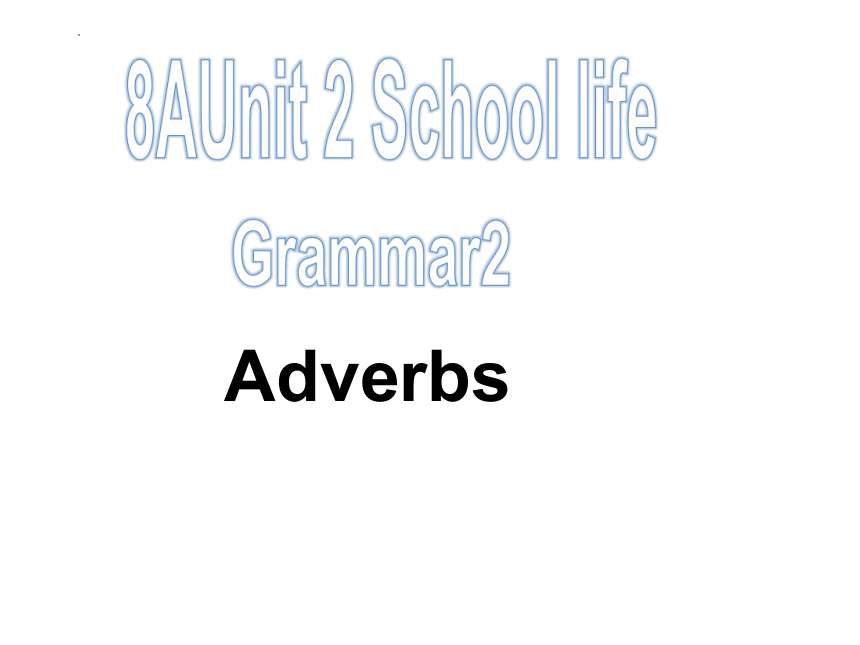
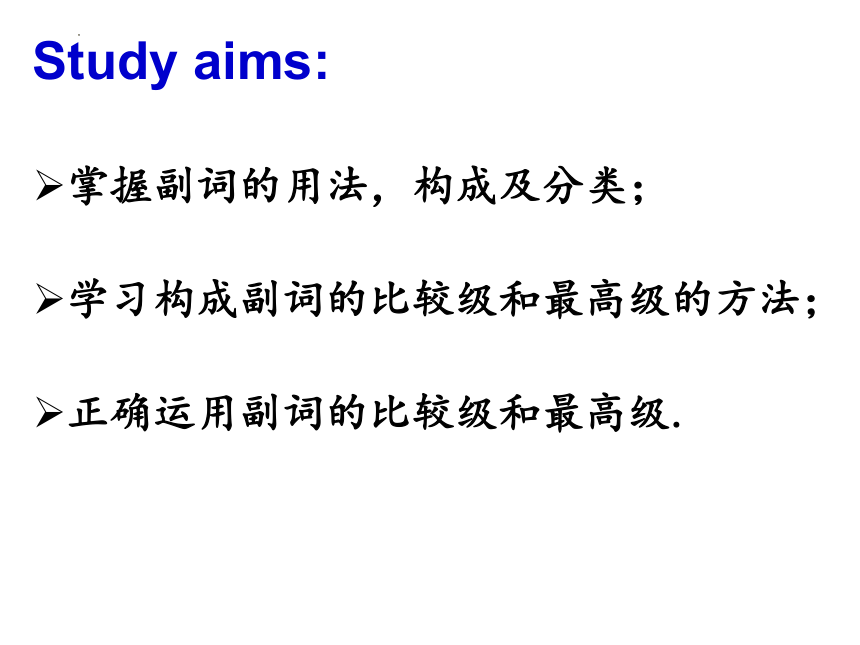
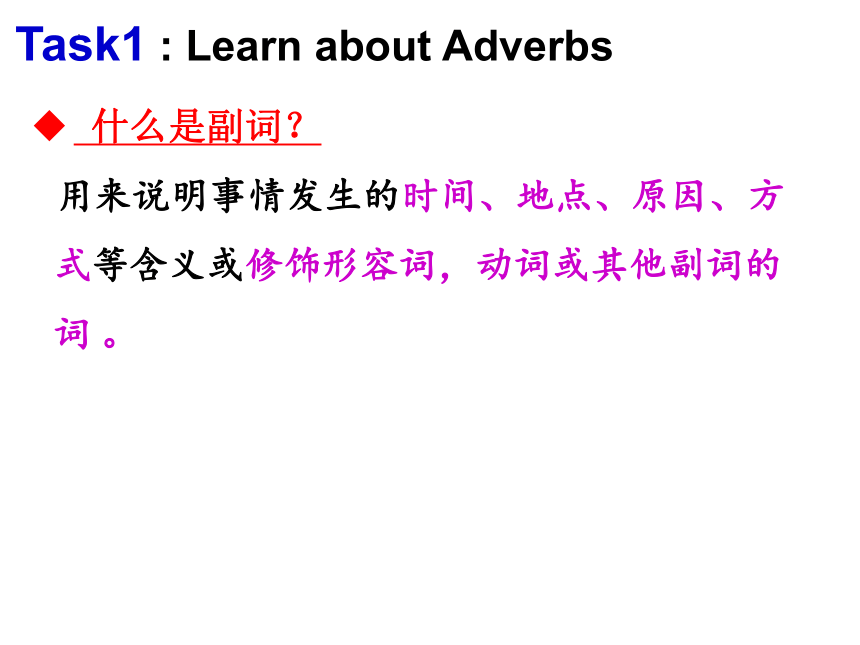
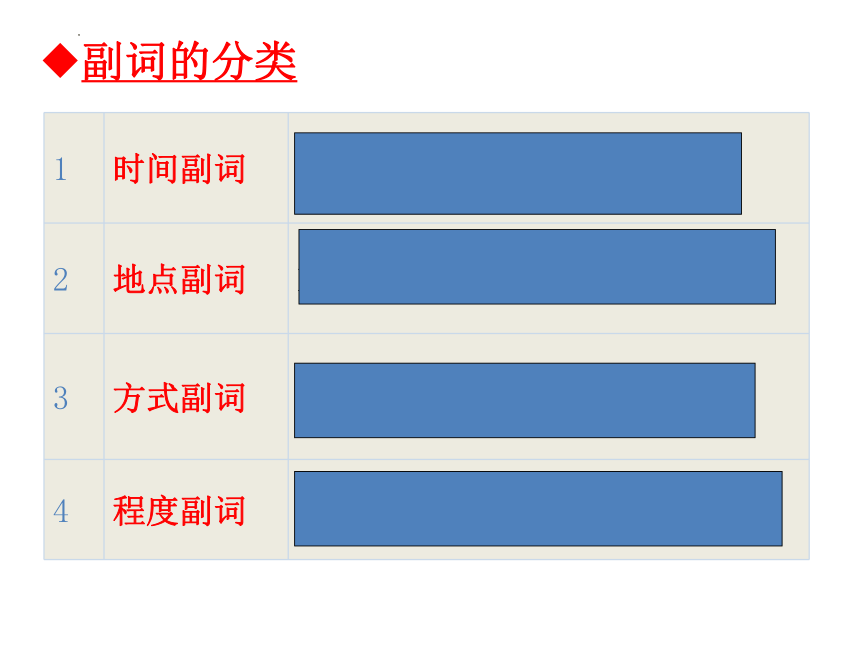
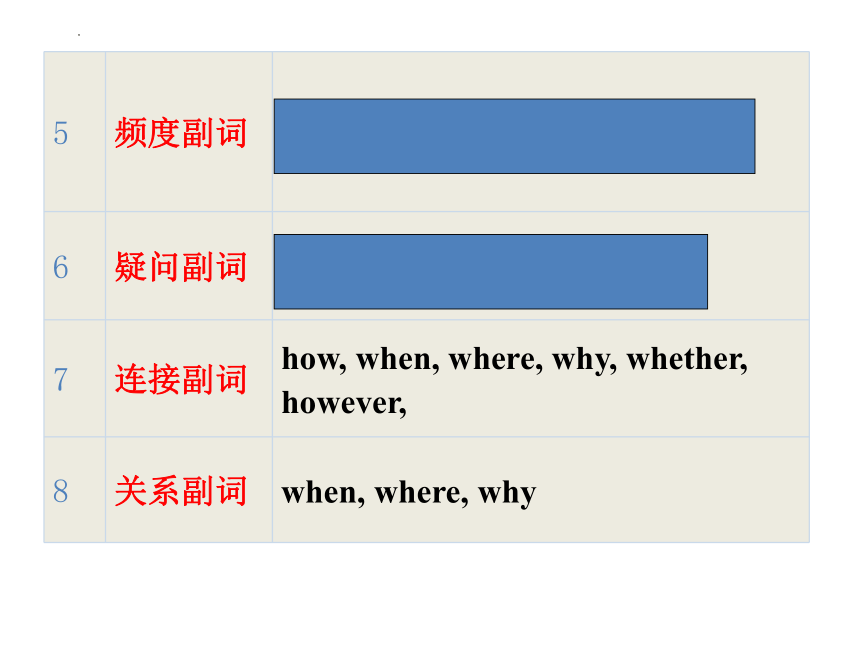
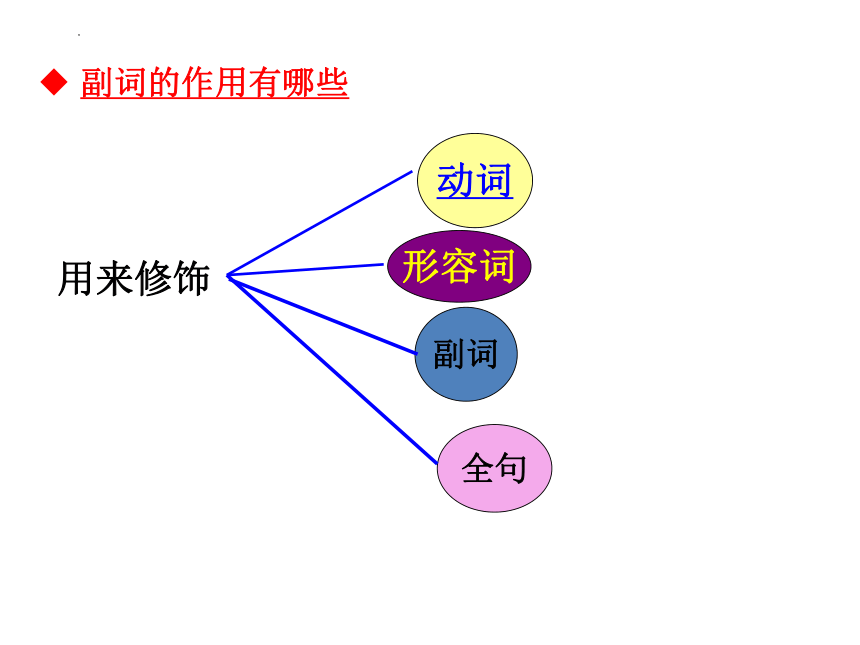
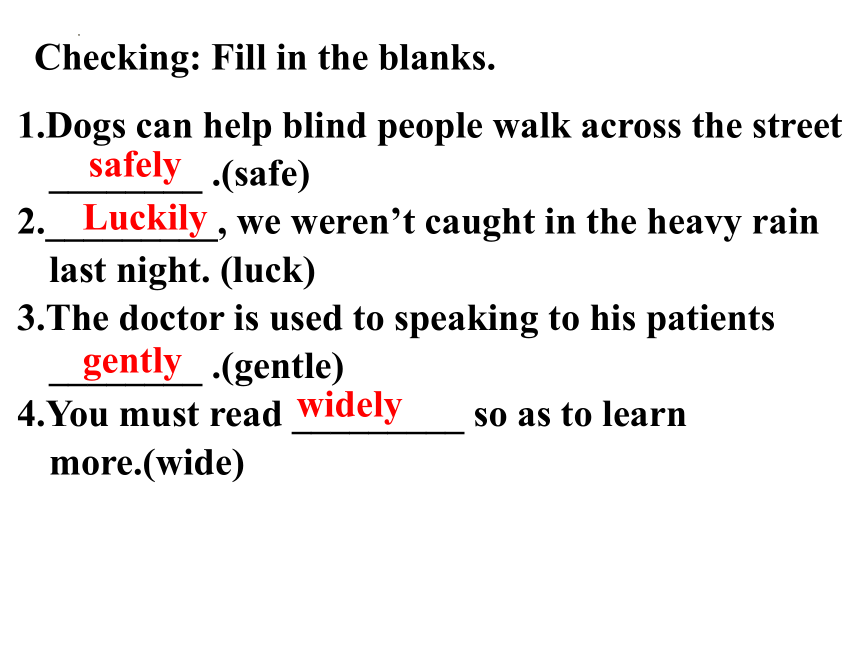
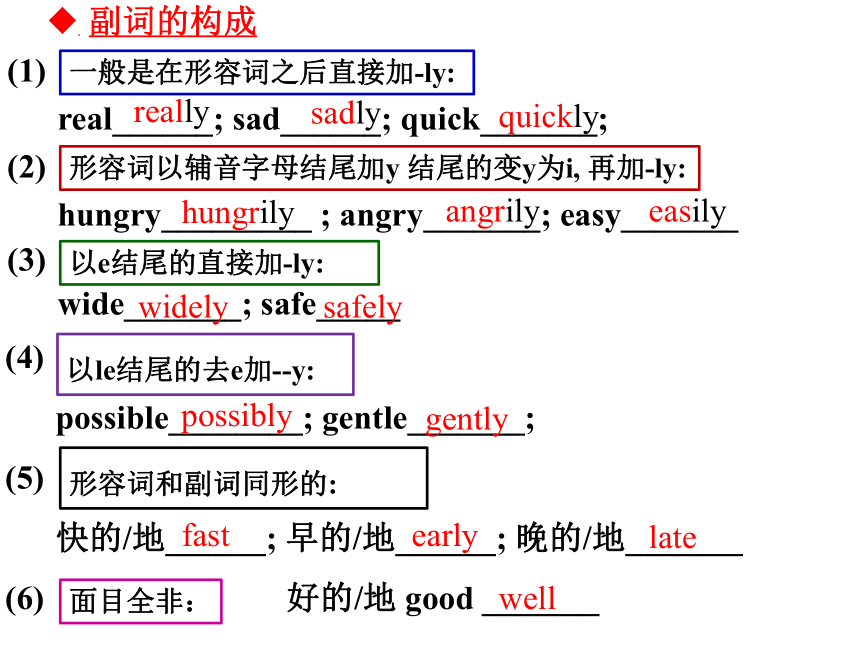
文档简介
(共27张PPT)
Lead in: Look and say
Sun Bintian runs very fast.
Quan Hongchan was lifted high by her coach.
Sun Yingsha plays table tennis quite well .
Grammar2
8AUnit 2 School life
Adverbs
掌握副词的用法,构成及分类;
学习构成副词的比较级和最高级的方法;
正确运用副词的比较级和最高级.
Study aims:
Task1 : Learn about Adverbs
用来说明事情发生的时间、地点、原因、方式等含义或修饰形容词,动词或其他副词的词 。
什么是副词?
副词的分类
1 时间副词 soon, now, early, finally, today, recently
2 地点副词 here, outside, there, home,abroad
3 方式副词 hard, well, fast, slowly, really
4 程度副词 almost, nearly, very, quite, rather
5 频度副词 always, often, frequently, seldom, never
6 疑问副词 how, where, when, why
7 连接副词 how, when, where, why, whether, however,
8 关系副词 when, where, why
副词的作用有哪些
用来修饰
动词
形容词
全句
副词
1.Dogs can help blind people walk across the street ________ .(safe)
2._________, we weren’t caught in the heavy rain last night. (luck)
3.The doctor is used to speaking to his patients ________ .(gentle)
4.You must read _________ so as to learn more.(wide)
safely
Luckily
gently
widely
Checking: Fill in the blanks.
副词的构成
(1)
real______; sad______; quick_______;
(2)
hungry_________ ; angry_______; easy_______
(3)
wide_______; safe_____
really
hungrily
sadly
quickly
angrily
easily
widely
safely
(4)
possible________; gentle_______;
(5)
快的/地______; 早的/地______; 晚的/地_______
(6) 好的/地 good _______
possibly
gently
fast
early
late
well
一般是在形容词之后直接加-ly:
形容词以辅音字母结尾加y 结尾的变y为i, 再加-ly:
以e结尾的直接加-ly:
以le结尾的去e加--y:
形容词和副词同形的:
面目全非:
Checking: 根据要求写出下列单词的正确形式
easy
correct
quiet
polite
noisy
heavy
luck
angry
easily
correctly
quietly
politely
noisily
heavily
luckily
angrily
注意:
一:true truly
它的形容词变成副词时是去e 再加 -ly
并非以-ly结尾的词都是副词
二:名词/动词后加ly ,构成形容词。如:
He is _____ (live), clever and outgoing.
Our neighbours are ________ (friend) and we are happy here.
lively
friendly
adj.
adj.
That question is very hard/difficult, I don’t know how to answer it. (那道题很难,我不知怎么解答)
( hard是形容词:困难的 , 相当于difficult)
2. The stone is very hard. 这块石头很硬。
( hard是形容词:坚硬的。)
3. study/work hard. (努力地学习/工作)
( hard是副词,修饰动词, 意为:努力地,勤奋地)
三:“hard”到底是形容词还是副词?
Eg: Peter is very lazy, he hardly gets up early in the morning.
Peter很懒, 他早上__________早起。
hardly 与 hard 有什么关系?
几乎不
Hardly: “几乎不”(否定词,表示否定)
1.
He is a good student./ I am good at English.
2.
He did his homework well.
feel well/look well
四:常见形容词与副词的形式一样的词:
hard fast high early long late well
good 和 well 的区别:
good 用作形容词
well 副词,形容词都可以。
1. Helping others makes us very _____
A. lonely B. proud C.lazy D.harmful
2. I haven’t seen her for a long time. I can _____ remember her name.
A. nearly B. almost C. hardly D. quite
3. The light music sounds very _____. I enjoy it very much.
A. beautiful B. well C. boring D. wonderfully
4.It was late. She opened the door ___ because she didn’t
want to wake up her grandma.
angrily B. quietly C. loudly D. heavily
5. Tom fell off his bike, and his hand was hurt _____.
A. quietly B. carefully C.slowly D. badly
Checking : Choose the right answer.
Task2 : Look and find out the rule.
1.大部分单音节词后加er或est
Adverb Comparative Superlative
Most short adverbs + er + est
hard high harder higher hardest
highest
2.多音节词和部分双音节词在词前加more或most
Adverb Comparative Superlative
Long adverbs more + most +
quickly carefully more quickly more carefully most quickly
most carefully
3.不规则变化
Adverb Comparative Superlative
Irregular adverbs replace the word replace the word
well badly far better worse further/farther best
worst
furthest/farthest
表示两者(人或事物)的比较时用比较级,
通常用连词 than 引导,
表示“较······”或“更······一些”的意思
Li Lei jumped farther than Jim (did).
Can you do better than he
He studied the subject further than I did.
Task3 副词比较级和最高级的用法
2. 副词的最高级的用法
副词的最高级通常用于一定的比较范围,如含有介词in,of或among构成的介词短语。副词的最高级前的定冠词the 可以省略。
eg:
(1) He who laughs last laughs best.
笑到最后笑得最好。
我们四个人中我唱的最差。
(2) Of the four of us, I sang(the )worst.
Checking : Finish the exercises on page24.
1. Sandy draws _____ (well). She draws _____ (well) than any other student in my class. She draws _________ (well) of us all.
My classmates
well
better
the best
2. David jumps ____ (high). He jumps _______ (high) than any other of my classmates. He jumps _________ (high) in my class.
3. Amy swims ____ (fast). She swims _____ (fast) than all my other classmates. She swims _________ (fast) in my class.
high
higher
the highest
fast
faster
the fastest
4. Millie writes ______ (quickly). She writes ____________ (quickly) than the other students in my class. Millie writes ______________ (quickly) of us all.
quickly
more quickly
the most quickly
3. 在表示 “和······一 样······”
“不及······” 这类概念时,可以用
“as+原级+as”和
“not as(so)+原级+as”的句型
eg: He does not run so (as) fast as I.
4.几种比较级的使用句型
eg:
He is working harder and harder.
He is more and more careful.
eg: The more carefully he listens to his teacher, the better result he gets.
a.“ 比较级 + and + 比较级 ”表示“ 越来越······ ”
b.“the + 比较级,+ the 比较级”
表示“ 越······就越······ ”
Exploration:Language points
1. come first/second /third
first, second, third 作副词用
2. She draws better than any other student in my class.
any 指任何一个, 名词student用单数
= She draws better than the other students in my class.
Summary
What did we learn in this class
Consolidation : Choose the right answer.
1.In my opinion, Tim doesn’t write English _____ his sister.
A. as clear as B. so clear as
C. more clearly as D. as clearly as
2.Remember, _______ you work, ______ result you will get.
A. the better, the harder B. the harder, the better
C. the more, the better D. the harder, the more good
3. We are too tired and hungry. So our steps are getting ___.
A. slow and slower B. slower and slowest
C. slower and slower D. more and more slowly
4. We must finish cleaning the office ___________.
A. as soon as possible B. as quickly as soon
C. as possible as soon D. as soon as possibly
Assignment:
Finish the relative exercises.
Lead in: Look and say
Sun Bintian runs very fast.
Quan Hongchan was lifted high by her coach.
Sun Yingsha plays table tennis quite well .
Grammar2
8AUnit 2 School life
Adverbs
掌握副词的用法,构成及分类;
学习构成副词的比较级和最高级的方法;
正确运用副词的比较级和最高级.
Study aims:
Task1 : Learn about Adverbs
用来说明事情发生的时间、地点、原因、方式等含义或修饰形容词,动词或其他副词的词 。
什么是副词?
副词的分类
1 时间副词 soon, now, early, finally, today, recently
2 地点副词 here, outside, there, home,abroad
3 方式副词 hard, well, fast, slowly, really
4 程度副词 almost, nearly, very, quite, rather
5 频度副词 always, often, frequently, seldom, never
6 疑问副词 how, where, when, why
7 连接副词 how, when, where, why, whether, however,
8 关系副词 when, where, why
副词的作用有哪些
用来修饰
动词
形容词
全句
副词
1.Dogs can help blind people walk across the street ________ .(safe)
2._________, we weren’t caught in the heavy rain last night. (luck)
3.The doctor is used to speaking to his patients ________ .(gentle)
4.You must read _________ so as to learn more.(wide)
safely
Luckily
gently
widely
Checking: Fill in the blanks.
副词的构成
(1)
real______; sad______; quick_______;
(2)
hungry_________ ; angry_______; easy_______
(3)
wide_______; safe_____
really
hungrily
sadly
quickly
angrily
easily
widely
safely
(4)
possible________; gentle_______;
(5)
快的/地______; 早的/地______; 晚的/地_______
(6) 好的/地 good _______
possibly
gently
fast
early
late
well
一般是在形容词之后直接加-ly:
形容词以辅音字母结尾加y 结尾的变y为i, 再加-ly:
以e结尾的直接加-ly:
以le结尾的去e加--y:
形容词和副词同形的:
面目全非:
Checking: 根据要求写出下列单词的正确形式
easy
correct
quiet
polite
noisy
heavy
luck
angry
easily
correctly
quietly
politely
noisily
heavily
luckily
angrily
注意:
一:true truly
它的形容词变成副词时是去e 再加 -ly
并非以-ly结尾的词都是副词
二:名词/动词后加ly ,构成形容词。如:
He is _____ (live), clever and outgoing.
Our neighbours are ________ (friend) and we are happy here.
lively
friendly
adj.
adj.
That question is very hard/difficult, I don’t know how to answer it. (那道题很难,我不知怎么解答)
( hard是形容词:困难的 , 相当于difficult)
2. The stone is very hard. 这块石头很硬。
( hard是形容词:坚硬的。)
3. study/work hard. (努力地学习/工作)
( hard是副词,修饰动词, 意为:努力地,勤奋地)
三:“hard”到底是形容词还是副词?
Eg: Peter is very lazy, he hardly gets up early in the morning.
Peter很懒, 他早上__________早起。
hardly 与 hard 有什么关系?
几乎不
Hardly: “几乎不”(否定词,表示否定)
1.
He is a good student./ I am good at English.
2.
He did his homework well.
feel well/look well
四:常见形容词与副词的形式一样的词:
hard fast high early long late well
good 和 well 的区别:
good 用作形容词
well 副词,形容词都可以。
1. Helping others makes us very _____
A. lonely B. proud C.lazy D.harmful
2. I haven’t seen her for a long time. I can _____ remember her name.
A. nearly B. almost C. hardly D. quite
3. The light music sounds very _____. I enjoy it very much.
A. beautiful B. well C. boring D. wonderfully
4.It was late. She opened the door ___ because she didn’t
want to wake up her grandma.
angrily B. quietly C. loudly D. heavily
5. Tom fell off his bike, and his hand was hurt _____.
A. quietly B. carefully C.slowly D. badly
Checking : Choose the right answer.
Task2 : Look and find out the rule.
1.大部分单音节词后加er或est
Adverb Comparative Superlative
Most short adverbs + er + est
hard high harder higher hardest
highest
2.多音节词和部分双音节词在词前加more或most
Adverb Comparative Superlative
Long adverbs more + most +
quickly carefully more quickly more carefully most quickly
most carefully
3.不规则变化
Adverb Comparative Superlative
Irregular adverbs replace the word replace the word
well badly far better worse further/farther best
worst
furthest/farthest
表示两者(人或事物)的比较时用比较级,
通常用连词 than 引导,
表示“较······”或“更······一些”的意思
Li Lei jumped farther than Jim (did).
Can you do better than he
He studied the subject further than I did.
Task3 副词比较级和最高级的用法
2. 副词的最高级的用法
副词的最高级通常用于一定的比较范围,如含有介词in,of或among构成的介词短语。副词的最高级前的定冠词the 可以省略。
eg:
(1) He who laughs last laughs best.
笑到最后笑得最好。
我们四个人中我唱的最差。
(2) Of the four of us, I sang(the )worst.
Checking : Finish the exercises on page24.
1. Sandy draws _____ (well). She draws _____ (well) than any other student in my class. She draws _________ (well) of us all.
My classmates
well
better
the best
2. David jumps ____ (high). He jumps _______ (high) than any other of my classmates. He jumps _________ (high) in my class.
3. Amy swims ____ (fast). She swims _____ (fast) than all my other classmates. She swims _________ (fast) in my class.
high
higher
the highest
fast
faster
the fastest
4. Millie writes ______ (quickly). She writes ____________ (quickly) than the other students in my class. Millie writes ______________ (quickly) of us all.
quickly
more quickly
the most quickly
3. 在表示 “和······一 样······”
“不及······” 这类概念时,可以用
“as+原级+as”和
“not as(so)+原级+as”的句型
eg: He does not run so (as) fast as I.
4.几种比较级的使用句型
eg:
He is working harder and harder.
He is more and more careful.
eg: The more carefully he listens to his teacher, the better result he gets.
a.“ 比较级 + and + 比较级 ”表示“ 越来越······ ”
b.“the + 比较级,+ the 比较级”
表示“ 越······就越······ ”
Exploration:Language points
1. come first/second /third
first, second, third 作副词用
2. She draws better than any other student in my class.
any 指任何一个, 名词student用单数
= She draws better than the other students in my class.
Summary
What did we learn in this class
Consolidation : Choose the right answer.
1.In my opinion, Tim doesn’t write English _____ his sister.
A. as clear as B. so clear as
C. more clearly as D. as clearly as
2.Remember, _______ you work, ______ result you will get.
A. the better, the harder B. the harder, the better
C. the more, the better D. the harder, the more good
3. We are too tired and hungry. So our steps are getting ___.
A. slow and slower B. slower and slowest
C. slower and slower D. more and more slowly
4. We must finish cleaning the office ___________.
A. as soon as possible B. as quickly as soon
C. as possible as soon D. as soon as possibly
Assignment:
Finish the relative exercises.
